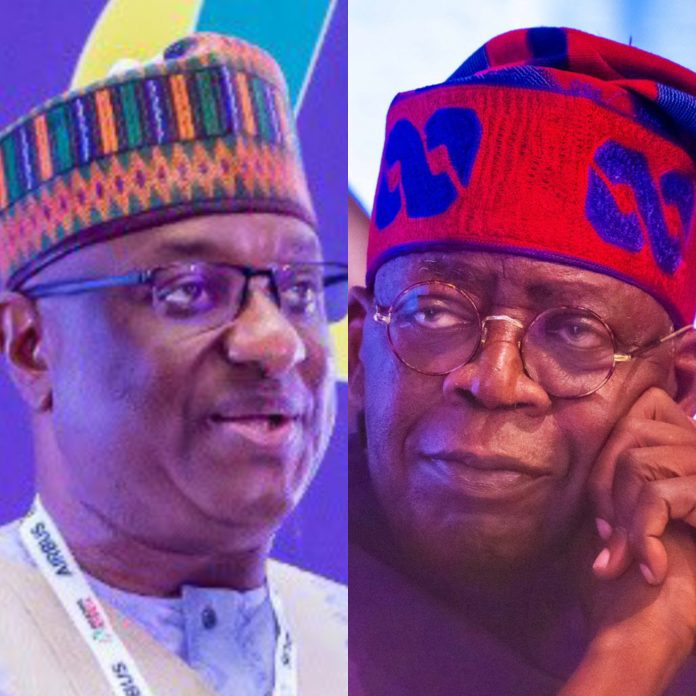Aviation Minister, Festus Keyamo, President Bola Tinubu
By Our Reporter
President Bola Tinubu yesterday, directed the Central Bank of Nigeria, CBN, to create a platform for quarterly reconciliatory meetings with foreign airlines to address the backlog of trapped funds in excess of $600 million.
This came as leading aircraft manufacturer, Airbus Industrie, on the sidelines of the summit, predicted that Nigeria’s domestic air traffic was set to increase by five per cent annually for the next two decades.
This is even as the International Air Transport Association, IATA, criticized Nigeria over multiple charges imposed on airlines operating in the country.
Minister of Aviation and Aerospace Development, Festus Keyamo, who disclosed news of the reconciliatory meeting yesterday at the ongoing African Aviation Summit in Abuja, noted that the development was one of the reasons President Tinubu travelled to the United Arab Emirates, UAE.
He also unveiled three roadmap projects, which include aerotropolis, aircraft leasing Company, ALC, and Maintenance Repair and Overhaul, MRO, facility, as well as five focus areas to realise the country’s vision of becoming an aviation hub in Africa.
The key areas listed include infrastructure upgrade, ALC, MRO facility and forex availability.
Keyamo said: “The recent global events further exposed the immense contribution and importance of air transportation as a catalyst for economic development, vital engine of global socio-economic growth, one of the greatest contributors to the advancement of modern society and a key instrument for achieving the United Nations Sustainable Development Goals, SDGs.
“These underscore why the world was greatly impacted when international aviation was disrupted by the pandemic and other global occurrences. It is the vision of this current administration to make Nigeria the aviation hub of Africa.
“Government welcomes major players in aircraft leasing and head lessors to invest in Nigeria airlines to provide state of the art aircraft.
“The government will ensure the enforcement of contract agreements and the rights of investors and indeed all parties are protected and Nigeria being a signatory to the Cape Town Convention will uphold international obligations.
“This administration is committed to ensuring that forex is readily available to entrepreneurs, thus the president has directed that the CBN holds quarterly reconciliation meetings, with a view to resolving this issue.
“CBN is open to providing tax holidays to encourage existing and new entrants into the Nigerian aviation sector. I wish to reiterate that my administration, will continue to sustain the support being given to the industry.
“MRO facility is another critical aspect that can make the Nigerian aviation industry a hub on the continent. With the shortage of qualified engineers, the current administration is willing to provide all the necessary support for the establishment of world-class MROs and training organisations.
“On upgrading infrastructure, this includes upgrading of the Cat3 landing system, at major airports, construction of the second runway in Abuja, airport improvement programmes through concession and government willingness to partner with companies to turn major airports into Aerotropolis.
“On tax holidays, the current administration is open to providing tax holidays to encourage existing and new entrants into the Nigerian aviation sector.”
IATA criticizes Nigeria on charges imposed on airlines
Also, the International Air Transport Association, IATA, also criticized Nigeria over multiple charges imposed on airlines operating in the country and withholding of their dollar funds earned from operations.
For instance, in Nigeria, foreign airlines collect naira for their tickets and exchange the same for foreign currencies for their customers.
The airlines have been lamenting their inability to get the exchange executed through the official foreign exchange market due to the scarcity of foreign exchange, a development which forced the UAE flag carrier, Emirates Airlines, to suspend its operations in the country.
It was also responsible for the move by the airlines to close down their lower fair inventory to travelling agents across Nigeria, denying them access to issuing tickets emanating from other countries into Nigeria in a bid to reduce the backlog.
Vanguard gathered that travellers from Nigeria pay about N2.5 million for economy tickets to London Heathrow airport on KLM; over N2.6 million on Virgin Atlantic; and N2.7 million on Lufthansa.
Travellers from Ghana, South Africa, among others, in Africa pay between N400,000 and N500,000 for same ticket to same destination.
‘Airports charges highest in Nigeria’
On multiple charges imposed on airline operations in Nigeria, IATA’s, Vice President, Africa and Middle East, Kamil Al Alwadi, identified about such 27 charges.
According to him, research indicates that Nigeria holds the top position in terms of airport charges among African countries.
He noted that Abuja airport remained the most costly airport in Africa, closely followed by Lagos airport.
He lamented the stunted growth of aviation in the region, especially Nigeria, calling on the Nigerian government to create a conducive environment for airlines to thrive.
In his word: “In a recent research conducted web discovered that the most expensive airport in Africa is Abuja airport, followed by Lagos airport, with all these exorbitant charges, Nigerian airlines can’t compete with their foreign counterparts.
“Africa has put itself in a a place where it cannot help its own, expensive fuel, excessive charges, leasing and insurance through the roof, the airlines need to be financially viable too. The airlines contribute to the country’s GDP but Nigeria needs to decide what to do for them to survive.
“Carriers based in Africa are expected to generate a moderate combined loss of around USD 484 million in 2023 because the continent remains a challenging market to operate an airline, with economic, infrastructure and connectivity challenges impacting industry performance.
“However, despite the challenges, the industry continues to move towards profitability, following the COVID disruption and could be in the black as soon as next year. ‘’Underpinning this is the robust demand for air travel. As we saw in the second quarter of 2023 – and for two consecutive quarters – African carriers had one of the world’s highest annual passenger traffic growth rates, second only to Asia Pacific.
“With total traffic up 38.9 per cent compared to the same quarter in 2022, African carrier’s growth outperformed the industry-wide average for total and international traffic, even though the region has not fully recovered to pre-pandemic levels. Q2 2023 RPKs were 9.2 percent below the same quarter in 2019.
“Despite this continued positive performance, the region still confronts economic challenges that severely limit the affordability of air travel, in addition to a range of infrastructure issues that curb capacity and hinder the development of consistent
Meanwhile, leading aircraft manufacturer, Airbus Industrie has predicted that Nigeria’s domestic air traffic was set to increase by five per cent annually for the next two decades.
It also asserted that the sector will grow by over four per cent yearly in Africa between 2019 and 2042.
Joep Ellers, Airline Marketing Director, Africa, Airbus, stated this on Tuesday in Abuja on the sideline of the 7th Aviation Summit which commenced in Abuja.
According to Ellers, air transportation is a major contributor to Nigeria’s economy and needs the cooperation of all for the sector to thrive.
He emphasized that there would be a 2.9 per cent growth in passenger traffic within Nigeria from 2019 to 2042, noting that the growth would necessitate the acquisition of an additional 160 aircraft to cater for the increasing demand within the Nigerian market.
According to him, the number of aircraft includes 131 single-aisle aircraft such as the A220, A320 families, and 28 widebody aircraft such as the A330 and A350 families serving the Nigerian market in the next two decades.
Ellers added that Airbus also predicts that the aviation sector growth on the continent would drive average yearly services demand up by 4.1per per cent, from $2 billion to $7 billion.
He said: “Growing Maintenance Repair and Overhaul, MRO, services at both local and regional levels are central to the sector’s growth, safety and longevity.
“The expansion of MRO capabilities in the country could serve to bring in additional revenues, reduce aircraft maintenance costs and provide even further opportunities for job creation and skills development in Nigeria and the continent at large.
“As Nigeria and indeed Africa’s aerospace industry grows and becomes more dynamic, an increasing demand for specialized skills is creating thousands of new opportunities for young people on the continent. Already, an estimated 7.7 million direct and indirect jobs have been created by the industry in Africa.”


